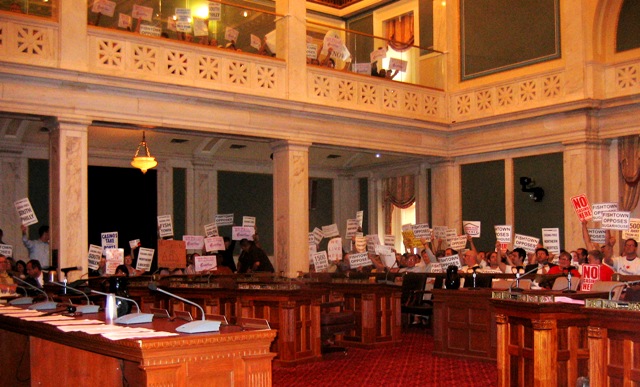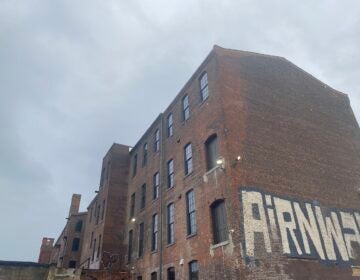Casino sound and fury floods City Hall

June 13
By Matt Blanchard
For PlanPhilly
There was plenty of sound and fury in City Council on Wednesday – expect no less when casinos top the agenda – but might it signify nothing?
Weeks of build-up to the June 13th Committee of the Rules hearing drew a raucous, overflow crowd, chanting, stomping and waving signs both for and against Sugarhouse casino through seven hours of testimony.
At issue were two diametrically opposed sets of legislation:
The set introduced by outgoing councilman Juan Ramos would grant Commercial Entertainment District status to Sugarhouse, enabling work on the $500 million project to begin. The second set of bills, sponsored by Frank DiCicco, would ban both Foxwoods and Sugarhouse from their current locations, or else move them outside a 1,500-foot “buffer zone” around residential neighborhoods. One aims to make Sugarhouse, the other to break it.
The vote? There was none. Committee chair Anna Verna announced all legislation would be held through summer recess and taken up when council reconvenes in September.
But in the decision to delay voting lies the true event. In the strategies deployed by both sides on Wednesday, the shape of coming casino battles can be seen.
This summer, expect movements toward both reconciliation and rebellion. Civic associations will be urged to finally meet casinos at the negotiating table and strike a deal. Casinos may win the zoning they need, not from the city, but from the state Supreme Court. Anti-gaming activists will make the case that casinos actually drain the public coffers, rather than fill them. And if all else fails, the die-hards will prepare for Plan B, non-violent resistance in the streets.
Why Council Delayed
According to committee chair Verna, the decision to delay was made with a pending decision by the state Supreme Court very much in mind.
“I think everybody had a different reason,” Verna said. “However, it is felt that the Supreme Court will be rendering a decision any day now, so we should not be going forward for naught.”
Angry with delays, Foxwoods asked the court in a June 1 filing to order Philadelphia to permit casino construction under the site’s current zoning. Their principle claim was that city foot-dragging was causing irreparable harm to the project. A ruling is expected in the coming days.
A favorable decision for Foxwoods could open the way for construction at both casino sites. City Council could find its actions rendered moot. So why take a politically risky vote when it might not stick?
DiCicco, meanwhile, believes he had enough votes to defeat Ramos’ rezoning bill had the matter not been delayed. “Based on my count – and I’m not going to give specific names – there was enough support in there to kill Ramos’ bills today,” he said.
DiCicco’s first district covers both casino sites. He said many on the committee expect to see community groups spend the summer talking to casinos and hashing out so-called “community benefit agreements” in which casinos promise to mitigate their impact on surrounding neighborhoods. Sugarhouse has already pledged $1 million to fund a special services district to improve Fishtown.
A summer of talk?
Such talk would break a long silence. For the past few months, a coalition of 24 established civic associations called the Delaware River Neighborhood Alliance has enforced a moratorium on all negotiations with casinos, fearing divide-and-conquer tactics and seeing no reason to reach agreements unless the city was a party to the discussion.
A big crack in that moratorium appeared last month: Fishtown Action, a break-away community group that embraces negotiations with Sugarhouse, drew 300 residents to a meeting with casino executives. FACT members see a bright future of jobs and generous casino donations to neighborhood causes.
The appearance of FACT has Councilman Bill Greenlee hoping for compromise.
“There is a certain part of Fishtown that will always be opposed. There seems to be a portion of Fishtown that is willing to talk. And then there’s some who might say, ‘Is it time to start talking?’” Greenlee said. “If you just say no, no, no, you end up with nothing.”
Greenlee pointed to the remarks of A J Thompson, an apparently anti-casino Fishtown community leader, who begged council to take a leadership role in casino talks.
“There is a feeling in the community, that it may be time to meet with the operator,” Thompson told the committee. “I agree that it’s time to talk. I’m asking the council to take the reins … Create a table that people need to get at.”
On Wednesday evening, the DRNA itself was scheduled to meet with state Sen. Vince Fumo, the principle author of Act 71 legislation that began the casino licensing saga in 2004. The meeting was closed to the public, the agenda unknown.
The urge to negotiate does not extend to Casino Free Philadelphia leader Daniel Hunter.
“A time to talk? Absolutely,” Hunter quipped. “It’s time for Sugarhouse to talk about where they’re going to move to.”
Casino Free intends to continue vigorous community organizing, and for its members, the organization will retain a teacher of non-violent protest strategies in order to “prepare for a more direct confrontation,” Hunter said, including sit-ins and other traditional and non-traditional non-violent action techniques.
“The fact of the matter is, there is a deep-seated resistance to casinos on these sites,” Hunter said. “It’s time for them to look for alternatives, and if they don’t, we’ll have to continue to escalate our struggle.”
Casino Free also plans to publicize a surprising economic argument highlighted during Wednesday’s hearing.
Tax Jackpot or Money Pit?
The best thing about casinos is that they pay taxes – handsomely. City Planning director Janice Woodcock recently reported a projected casino contribution of $100 million in taxes, fees and other revenue to the city of Philadelphia over the first five years of operation, a quarter of which will go directly to the schools. Add to that the construction jobs to build them (wages worth $34 to $69 million) and a possible 7,000 to 12,000 new jobs either in the casinos or in spin-off enterprises, and you can see why building trade unions support them. And since some casino revenue is earmarked to help expand the Pennsylvania Convention Center, itself an economic generator, you might toss tens of millions more on to the public profit pile.
But two professors testifying at Wednesday’s hearing argued the casino money pile is actually a money pit, possibly $29 million deep on an annual basis. Frederic H. Murphy of Temple’s Fox School of Business and Robert Goodman of Hampshire College presented data suggesting a real accounting of casino impacts is precisely the opposite of what council imagines.
Goodman argued that while casino destinations like Las Vegas draw tourist dollars from other states, Philadelphia’s casinos are likely to suck money mostly from the local economy, drawing dollars away from local eateries, bars and other venues. Atlantic City, Goodman claimed, lost 40 percent of its restaurants and a third of its businesses in the years after casino introduction.
Because he spoke at lunchtime, Goodman, a former member of the National Gambling Impact Study Commission, was heard by all of two council members, until one of them wandered off.
Murphy applied the same argument to Sugarhouse Casino, predicting that almost all visitors will hail from the city, and that they’ll be spending dollars that would’ve generated far more jobs had they been spent in bars or museums rather than being fed into a machine. One million spent at a casino generates 4.3 jobs, Murphy said, while the same one million spent at other locations generates 14 jobs. As a result, Murphy claimed that rather than gain 12,000 jobs, the city will end up 3,922 jobs in the red.
“If you don’t believe me, think about what happened when Home Depot opened to the building supply firms on Washington Ave.,” he said. “Center City Lumber is gone. 11th Street Lumber is gone.”
Murphy’s argument was bolstered by the Wall Street Journal’s highly critical June 11th article questioning the economic wisdom of state licensed gambling, entitled “Bad Odds: As more states look to win the economic jackpot with casinos, evidence suggests they are playing a losing hand.”
Sugarhouse President Bob Sheldon didn’t get a rebuttal, but found his cause supported by four chambers of commerce, union leaders and tourism officials.
Sheldon stressed that the 1,100 new jobs at Sugarhouse will pay an average wage of $40,000, with benefits – all on a lot now choked with weeds and running over with rats.
“Every day of delay costs Sugarhouse casino significant amounts of money, and it costs the city of Philadelphia,” Sheldon said.
Emotions and Analysis
The rest of the day was marked by volleys of emotional and analytical arguments supporting or criticizing casinos and gaming.
The city administration was first up, describing the process by which SugarHouse adjusted its design plans in a number of ways, including public access to the river, parking, and a massive green roof, in order to receive approval of the City Planning Commission last month.
SugarHouse presented its specific site plans and made the case for a prompt permitting process. “I am aware of no other project along the river, or in the entire city, that will create such public spaces,” said project architect Ian Cope.
And a letter from the Central Delaware Riverfront Planning advisory group, calling on the city planning commission to conduct business with the two proposed casinos in a more open and transparent manner, was read into the record.
Steven A. Weixler, advisory member for Society Hill, said that while PennPraxis worked with the public to develop urban design principles, he was “greatly distressed” that the city’s planning commission appeared to have ignored them.
More presentations rolled on through the day, as labor leaders, pastors, academics and regular citizens made their cases for “build” or “no build”.
Passions at the start were so high it felt like a pep rally, with scores of union workers from the building trades chanting “Casinos equal jobs!” and an equivalent army of anti-casino neighbors chanting back: “Move them or lose them!”
Council president Anna Verna had to gavel the foot-stomping audience to order six times and eventually threatened to end the proceedings if order wasn’t restored.
Needed: A Tougher Buffer?
If your name was Buffer, you might’ve thought Wednesday’s hearing was your birthday party, such was the glory heaped on your name. Councilman DiCicco’s proposed ordinance would mandate a 1,500-foot buffer zone separating casinos from residential neighborhoods, schools and places of worship. It was celebrated by activists, residents and a panel of impassioned clergy.
“A 1,500-foot buffer is supported by 95 percent of Philadelphians,” asserted lawyer Paul Boni.
“Adopt the buffer,” said Reverend Dick Ullman of St. Peter’s Episcopal. “…The idea of a buffer zone is nothing new, though I dare say it is universal.”
For DiCicco, the buffer is a stick to beat the casinos off their current sites, and away from neighborhoods in his district. Moving the casinos is his major goal, and the buffer one strategy for getting there.
“It’s always been about the locations,” DiCicco said. “I need to continue to do that [push for the buffer] because it will hopefully keep the pressure on for people to sit down and decide, one way or another, whether this casino site is acceptable or not.”
But even if it passes council, does the buffer stand a chance? Is it legal?
The skepticism started with City Solicitor Romulo Diaz, who argued that no mere council bill could budge the casinos. Only the state could do that. “A relocation decision is a decision of the state Gambling Control Board. We don’t have that authority. Even a licensee cannot make that decision.”
A lawyer for Foxwoods was downright disdainful, though in a lawyerly way:
“All of the proposed bills are unwise and illegal,” said William Schwartz. “Act 71 gave the Gaming Control Board exclusive siting and licensing power … The city of Philadelphia is an entity of the Commonwealth of Pennsylvania. The proposed ordinance exceeds the power granted to the city.”
And among DiCicco’s colleagues on council, belief in the buffer is by no means universal. Bill Greenlee feels the buffer is not viable.
“I don’t think the court will ever uphold it. I don’t think 1,500 feet is something that’s going to happen,” Greenlee said, based on the idea that state courts already struck down the ballot measure on which DiCicco’s buffer is based.
Councilman Darrell Clarke, whose district abuts the Sugarhouse site, was equally pragmatic.
“The legislation proposed on the 1,500 foot buffer appears to be the same legislation that was struck down by the state Supreme Court, so I don’t see any reason why it wouldn’t meet a similar fate,” Clarke said. “The state act clearly gives the siting responsibility to the Gaming Control Board, period. Once you start prohibiting locations based on an arbitrary number, then you’re taking that role out of the state gaming commission.”
So is there some other way the casinos might move? Perhaps by negotiated settlement?
“I am not privy to all conversations, but I have seen no evidence that there is going to be any changing of the sites by the state or by either of the parties involved,” Clarke said. “I’ve seen no evidence of that whatsoever, anywhere.”
If Clarke is correct, the buffer’s only chance lies with state Rep. Babette Josephs, who last week introduced identical buffer legislation in Harrisburg. The Center City rep has 30 co-sponsors but unknown prospects for success.
If Clarke is correct, moving the casinos is extremely unlikely, which might explain why some on council are eager to see their constituents negotiating concessions from the casinos now.
Not surprisingly, Sugarhouse spokesman Dan Fee relegates ideas like the buffer to the realms of fantasy.
“A lot of these conversations are hypothetical. What would happen if the city wasn’t going to get two casinos? What would happen if they weren’t dedicated for these locations?” Fee said. “That’s akin to saying what would happen if the moon was made of cheese.”
WHYY is your source for fact-based, in-depth journalism and information. As a nonprofit organization, we rely on financial support from readers like you. Please give today.






